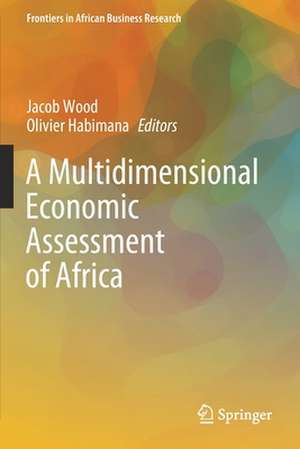A Multidimensional Economic Assessment of Africa: Frontiers in African Business Research
Editat de Jacob Wood, Olivier Habimanaen Limba Engleză Paperback – 29 mai 2021
| Toate formatele și edițiile | Preț | Express |
|---|---|---|
| Paperback (1) | 946.41 lei 6-8 săpt. | |
| Springer Nature Singapore – 29 mai 2021 | 946.41 lei 6-8 săpt. | |
| Hardback (1) | 954.14 lei 6-8 săpt. | |
| Springer Nature Singapore – 28 mai 2020 | 954.14 lei 6-8 săpt. |
Preț: 946.41 lei
Preț vechi: 1154.16 lei
-18% Nou
Puncte Express: 1420
Preț estimativ în valută:
181.12€ • 196.67$ • 152.14£
181.12€ • 196.67$ • 152.14£
Carte tipărită la comandă
Livrare economică 22 aprilie-06 mai
Preluare comenzi: 021 569.72.76
Specificații
ISBN-13: 9789811545122
ISBN-10: 981154512X
Ilustrații: XV, 318 p. 28 illus., 26 illus. in color.
Dimensiuni: 155 x 235 mm
Greutate: 0.47 kg
Ediția:1st ed. 2020
Editura: Springer Nature Singapore
Colecția Springer
Seria Frontiers in African Business Research
Locul publicării:Singapore, Singapore
ISBN-10: 981154512X
Ilustrații: XV, 318 p. 28 illus., 26 illus. in color.
Dimensiuni: 155 x 235 mm
Greutate: 0.47 kg
Ediția:1st ed. 2020
Editura: Springer Nature Singapore
Colecția Springer
Seria Frontiers in African Business Research
Locul publicării:Singapore, Singapore
Cuprins
1. An Overview: A Multidimensional Economic Assessment of Africa.- 2. Determinants of Smallholders’ Export-Oriented Cash Crop Production Decisions in Ethiopia: A Case of the Sesame Sector.- 3. Spatial integration of livestock markets in Ethiopia.- 4. New Urban Consumption Patterns and Local Agriculture: Application to the Bukavu HORECA Sector (DRC).- 5. Multidimensional Inequality in Ethiopia.- 6. Factors Influencing Consumers’ Preferences for Cement Products: Case of Cement Brands in Ethiopia.- 7. The Value of Roads in Rural Household Consumption.- 8. Corporate Social Responsibility Practices and Motivations in a Least Developed Country.- 9. Psychological Determinants of Employees’ Intentions to Retire: A Case of Public Universities in Kenya.- 10. Implementation of Corporate Governance Strategy: An Overview of Africa.- 11. Efficiency of Commercial Banks in Ghana.- 12. Cooperative Societies as a Distribution Channel forInsurance Services in Kenya: A Situational Analysis.- 13. The FDI-Domestic Investment Nexus in SSA.- 14. China’s Unprecedent Move and Its Repercussion on African Economies: Empirical Evidence from Ethiopia.- 15. Does Free Trade and Institutional Quality Affect the Economic Community of the West African Trading Bloc?.
Notă biografică
Jacob Wood is currently the Associate Dean of Research for the College of Business, Law and Governance in JCU Australia. In addition to this, he is also the Director of the Centre for International Trade and Business in Asia (CITBA) and a Senior Lecturer of International Business at JCU Singapore. Prior to joining JCU, Dr. Wood spent more than 10 years’ working in South Korea where he has held roles as an Assistant Professor at Korea University of Technology and Education and then more recently as an Assistant Professor of Asia Business at Chungnam National University. Dr. Wood specializes in the fields of international trade negotiation and the effect of non-tariff barriers on international trade flows.
Olivier Habimana is currently lecturer of economics and econometrics at the University of Rwanda, College of Business and Economics. Dr. Olivier’s main research interests lie in international macroeconomics and applied time series econometrics. His research has been published in Computational Economics, International Economics and Economic Policy, Journal of Economic Asymmetries and International Journal of Finance & Economics, among others. Dr. Olivier is a member of Rwanda Academy of Sciences.
Textul de pe ultima copertă
This book is a useful resources for government policy analysts, academics, students of higher education and business practitioners interested in African economies and the key economic issues these economies are facing in 2020. In the face of weak governance and growth globally, there is still a window of opportunity for countries in Africa to build on not only their traditional industrial capabilities, but also pave the way for positive developments in international trade and in the way governments tackle poverty and inequality. By focusing on four areas: (1) agriculture and livestock, (2) consumption, poverty and inequality, (3) financial services, employment and corporate governance, and (4) economic integration, international trade and foreign direct investment (FDI), this book presents a series of empirical studies that examine important contemporary economic issues facing Africa. The book incorporates a range of methodological approaches, with some chapters providing case study analyses while others embrace more traditional forms of econometric testing.
Caracteristici
Provides deeper understanding of the key issues facing the African region in 2020 Illustrates in detail the important areas of contemporary economic concern for Africa including an assessment of government policies related to the areas of agriculture, international trade, poverty and inequality, as well as financial services and corporate governance Is a useful resources for academics, higher education students, and business practitioners interested in African economics









